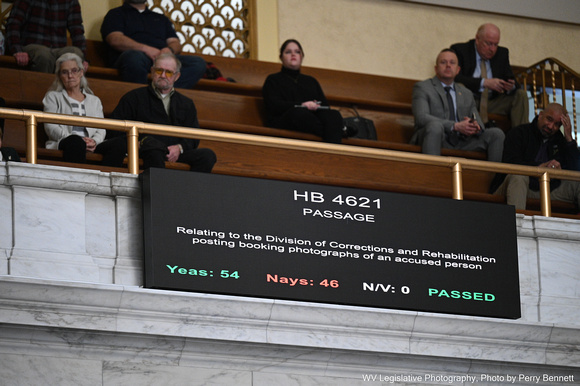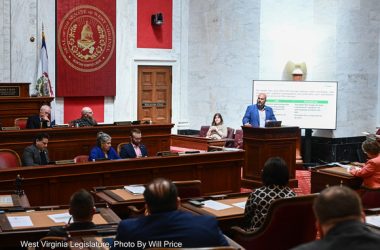By Autumn Shelton, West Virginia Press Association
CHARLESTON, W.Va. – The House passed a bill on Tuesday that would prohibit the West Virginia Division of Corrections from publishing mugshots on their website.
House Bill 4621 was passed by a vote of 54 to 46 following a lengthy debate. The bill prohibits the public release of mugshots (booking photos) following the arrest of an individual. Mugshots are currently considered public information.
The bill states that under certain circumstances a mugshot may be released to the public, including if the individual is a fugitive, an imminent threat to a person or to public safety, or if a judge orders the release of the mugshot.
Additionally, the bill states that a mugshot may be disclosed to law enforcement agencies and prosecuting attorney’s offices for “investigation, prevention, or prosecution of a crime, or to safeguard the orderly operation of a correctional institution.”
The bill also sets forth civil liabilities for third-party publications that do not remove a mugshot after receiving a request to remove an individual’s mugshot.
Rising in opposition of the bill was Del. Brandon Steele, R-Raleigh.
“To me, the whole purpose of a mugshot is two-fold,” Steele began. “One, to inform the public of what’s going on in their community, to let people know who’s in custody and why they’re in custody and what they’re charged with. The other thing is to protect the defendant, so that the world knows that that defendant is in custody. If we look at the state of our jails . . . we still have issues, and we’re gonna have issues for a while until the personnel issues catch up.”
Steele said that even though the bill allows members of law enforcement to obtain mugshots, it’s not helping them.
“What this does is it keeps the public from knowing who’s in custody,” Steele said, adding that he could tell “countless stories” of people finding their loved ones by viewing mugshots.
“What you’re doing here today is not protecting anybody,” Steele continued. “What it is is it’s putting our victims at risk. This is anti-victim. The people that are in our jail system right now are there for probable cause for offenses that are beyond non-violent misdemeanors. It means that someone had to have gotten hurt for them to be in there, or at least based on the way we have designed a PR (personal recognizance) bond. The public deserves to know who these individuals are.”
Del. David Kelly, R-Tyler, rose in support of the bill and what he called “the wall of shame,” especially for women who have their mugshots posted on a third-party website such as Facebook.
“Now, if that person’s released, the mugshot goes down at DCR, but these third-party people, they don’t take them down automatically,” Kelly said, adding that a person’s life can “be forever turned upside down because of a mistake that was made, and it’s almost impossible to redeem yourself.”
Del. Keith Marple, R-Harrison, then rose in opposition to the bill, saying that his background in criminal justice has taught him that people want to know “who is committing crimes in their neighborhoods, in the county and around. If a guy gets arrested in Clarksburg, his picture gets published in the paper, the police officers in the other jurisdictions don’t know this guy from Adam, but they look at the pictures and they look for those guys to appear in their jurisdictions.”
In response to a question, Del. Tom Fast, R-Fayette, chair of the House Judiciary Committee, said that under this bill members of the media will not be able to publish these mugshots.
“What they can do, though, if they are positioned where they see a person being arrested or walked from a police car into magistrate court or from magistrate court back to the police car, they can take photographs, and that’s fair game,” Fast said.
Del. Geoff Foster, R-Putnam, lead sponsor of the bill, added that this bill doesn’t prevent the media from publishing a photo they took, or of using a photo from Facebook.
“The only photos that are barred from being disseminated in the public are those of somebody who is never convicted of the crime,” Foster said.
House Bill 4621 will now go before the Senate for consideration.




